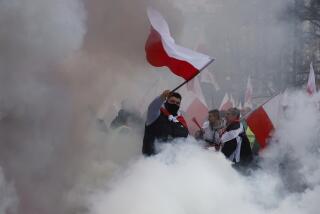Poland Orders Price Hikes on Foodstuffs, Other Items
- Share via
WARSAW — Poland on Saturday announced sweeping price increases effective today, ranging from about 10% to 100% for most basic foodstuffs, gasoline, cigarettes and alcohol as well as transportation and postal services.
Lech Walesa, a founder of Solidarity, said the outlawed labor movement was “ready and prepared to take up action” to resist the price increases “in line with the general decision of workers.”
“This time the working world should not agree to these price hikes,” Walesa said in a statement read over the telephone from his Gdansk apartment. “They (government officials) do not have a program of getting out of the (economic) crisis. Only a decided stand by workers may guarantee that the state enters the road in the direction of reforms.”
Push for Trade Unions
Walesa said the only way the Polish government could effectively reform the economy was by restoring free trade unions and other rights won by workers in the August, 1980, protests that led to the creation of Solidarity. The federation, the only free trade union movement in the Soviet Bloc, was suspended when martial law was imposed in December, 1982, and subsequently outlawed. Martial law later was lifted and replaced with a series of tough laws.
The government communique announcing the price hikes reflected its concern over worker reaction. Price increases led to worker revolts in 1970, 1976 and 1980.
In the communique read over radio and television, the Ministry of Finance said the price rises were lower than originally planned in response to criticism from Poland’s official trade union federation.
The ministry said it would partially meet the union demands by increasing compensation payments to low-income groups to offset the impact of the price rises.
‘An Economic Necessity’
“The government is aware that any price hikes are received very reluctantly,” the communique said. “They are, however, an economic necessity and resigning from them this year would have been from an economic point of view harmful and dangerous.”
According to the central economic plan for 1987, prices are to rise by an overall average of 14%. The government has said it will try to limit wage increases for workers to an average of 12% this year.
The All-Poland Trade Union Alliance said earlier this month it would undertake protest actions unless the government revised its pricing plans, which it said were unacceptable to workers.
The alliance, set up by the government to replace Solidarity, announced on Thursday it had agreed to a compromise on the price issue after the government said it would reduce the planned increases.
Lower Than Planned
In its communique, the government said the costs of basic foodstuffs will rise by an average of 9.6% this year instead of by 13% as originally planned.
Effective today, prices will increase for gasoline and motor oil, cigarettes, alcohol, and most basic foods, including bread, flour, milk, cheese, butter, sugar, tea, and cooking oil.
The food price rises ranged from as low as 7% for cooking oil to as high as 25% for tea and butter. The price of a standard loaf of bread is to go up 14%.
Cigarette and liquor prices are to rise by an average 20%, while the price for a liter of regular gasoline will go up by 25%.
Poland’s currency is the zloty, and there are 240 zlotys to the U.S. dollar, according to the official rate of exchange. The average monthly salary is the equivalent of about $104.
Other Price Hikes Due
The communique said that on Wednesday the government will raise meat prices by an average of 10% and the price of coal, gas and electricity, central heating and hot water will go up by a range of 23% to 51%.
It said it had scaled down the planned price hikes for central heating and hot water from 100% to 50%.
More to Read
Sign up for Essential California
The most important California stories and recommendations in your inbox every morning.
You may occasionally receive promotional content from the Los Angeles Times.













